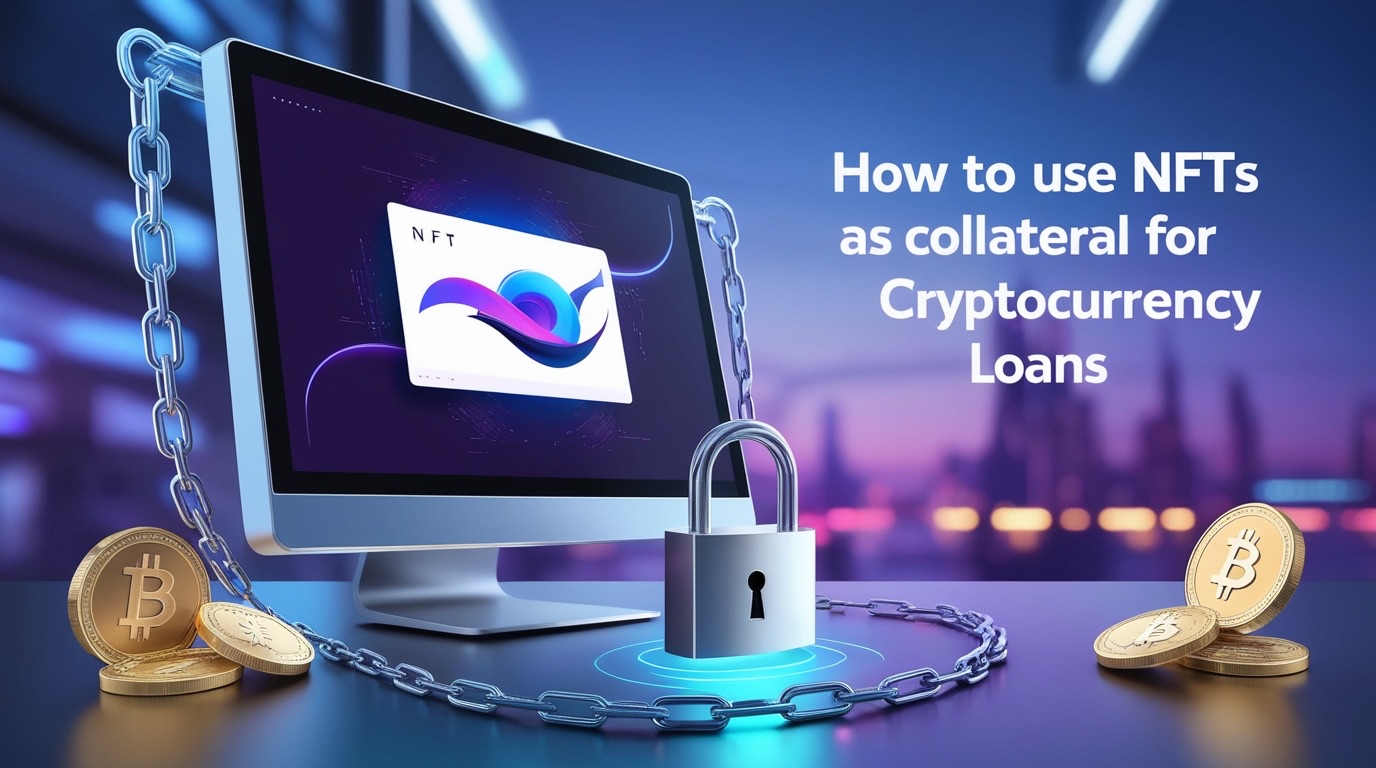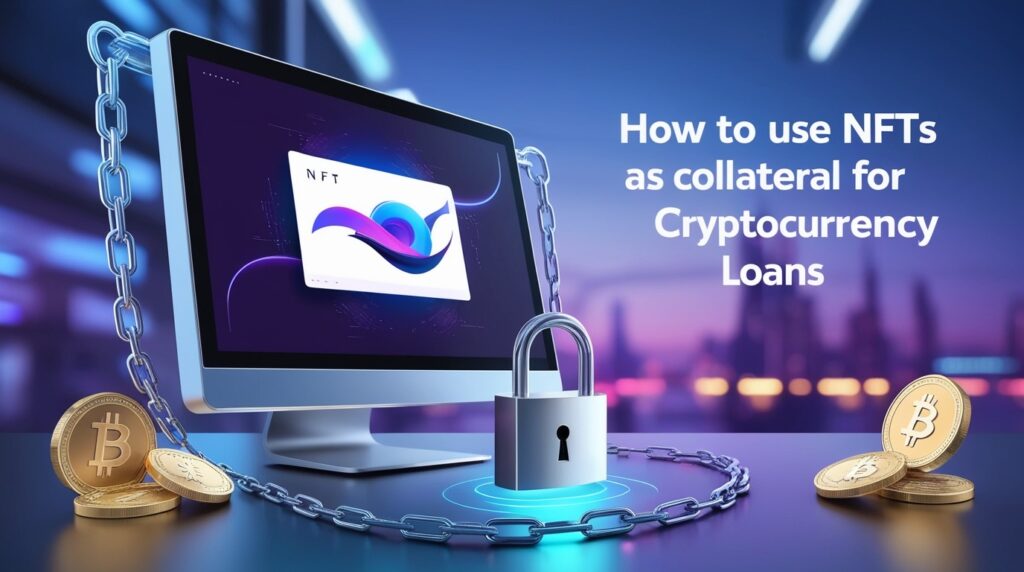The rise of decentralized finance (DeFi) has brought about several innovative ways to use digital assets, including non-fungible tokens (NFTs), as collateral for securing cryptocurrency loans. NFTs have traditionally been associated with art, gaming, and collectibles, but they are now being recognized as valuable assets with the potential to secure loans in the rapidly evolving cryptocurrency space. This blog post will explore how to use nfts as collateral for cryptocurrency loans, the benefits and risks involved, and how to navigate this emerging market.
Understanding NFTs and Their Value
What Are NFTs?
Non-fungible tokens (NFTs) are digital assets that represent ownership or proof of authenticity of a unique item, often linked to art, music, video, or other types of content. Unlike cryptocurrencies such as Bitcoin or Ethereum, NFTs are not interchangeable, meaning each NFT is one-of-a-kind and holds distinct value. This uniqueness and rarity are what make NFTs valuable in the market.
The Rise in NFT Popularity
NFTs exploded in popularity in recent years, with high-profile sales and widespread media coverage. Artists, musicians, and creators began using NFTs as a way to monetize their work, and collectors started viewing them as valuable assets. The NFT market, which once seemed niche, now draws attention from investors, businesses, and even celebrities. As the market continues to grow, NFTs are increasingly seen not just as collectibles but as assets that can be leveraged for financial opportunities, such as securing loans.
How NFTs Are Used as Collateral for Cryptocurrency Loans
The Role of NFTs in Collateralized Loans
In the traditional financial world, borrowers pledge assets, such as real estate or cars, to secure loans. Similarly, in the world of DeFi, cryptocurrency platforms have started accepting NFTs as collateral for loans. By using NFTs as collateral, borrowers can unlock liquidity without having to sell their valuable digital assets. This makes NFTs an attractive option for those who wish to retain ownership of their assets while accessing funds.
When you pledge an NFT as collateral, the lender locks the NFT in a smart contract, which acts as a guarantee that the borrower will repay the loan. If the borrower fails to repay, the NFT can be sold or transferred to the lender. The terms of the loan, including the interest rate and repayment period, will vary depending on the platform and the value of the NFT.
The Types of NFTs Accepted as Collateral
Not all NFTs are accepted as collateral, and the types of NFTs that can be used as collateral depend on the lending platform. Generally, NFTs with a proven track record of high sales prices, scarcity, and demand are more likely to be accepted. These include:
- Digital Art: NFTs tied to high-profile artwork or limited-edition digital art pieces are highly sought after.
- Virtual Real Estate: NFTs that represent virtual land or property in metaverse platforms like Decentraland or Sandbox can be used as collateral.
- Gaming Assets: NFTs tied to in-game items, skins, and characters are becoming more valuable and can serve as collateral in the gaming community.
- Music and Entertainment: NFTs associated with music or other entertainment content, particularly those that have been popular or feature renowned creators, can also be used as collateral.
The Process of Using NFTs as Collateral
The process of using NFTs as collateral for cryptocurrency loans generally follows these steps:
Choose a Platform: First, you need to select a DeFi lending platform that allows NFTs to be used as collateral. Popular platforms in this space include NFTfi, Drops, and MetaLend.
Submit Your NFT: Once you’ve chosen a platform, the next step is to submit your NFT for evaluation. The platform will assess the value of your NFT based on factors such as rarity, market demand, and past sale prices.
Get a Loan Offer: After evaluating your NFT, the platform will offer you a loan based on the collateral’s value. The loan is typically given in cryptocurrency (such as Ethereum or stablecoins) and can range from a percentage of the NFT’s value.
Repayment Terms: After accepting the loan offer, you will need to adhere to the repayment terms, which include the loan amount, interest rates, and repayment schedule. If you fail to repay the loan in time, your NFT may be forfeited to the lender.
Repayment and NFT Retrieval: Once the loan is repaid, your NFT is returned to you. If you cannot repay the loan, the lender has the right to liquidate the NFT to recover their funds.
Advantages of Using NFTs as Collateral for Cryptocurrency Loans
Access to Liquidity Without Selling NFTs
One of the main advantages of using NFTs as collateral is the ability to unlock liquidity without the need to sell the NFT. For collectors and creators, this is an appealing option because they can retain ownership of their valuable digital assets while still gaining access to capital.
Quick and Easy Process
The process of using NFTs as collateral is often faster and more streamlined than traditional lending methods. With decentralized platforms, loans can be secured in a matter of hours rather than days or weeks. Smart contracts eliminate the need for intermediaries, making the process more efficient and transparent.
Flexibility in Loan Terms
DeFi platforms that offer NFT-backed loans typically provide flexible loan terms. Borrowers can choose from a variety of cryptocurrencies for their loan, including popular options like Ethereum, Bitcoin, or stablecoins. This flexibility allows borrowers to select a loan that suits their needs.
Innovative Financial Opportunities
The ability to use NFTs as collateral opens up innovative financial opportunities for the NFT community. It allows creators, investors, and collectors to leverage their assets to generate funds for further investments or personal needs. This has the potential to boost the growth of the NFT and DeFi ecosystems.
Risks and Challenges of Using NFTs as Collateral
Volatility of the NFT Market
The NFT market is known for its volatility. Prices can fluctuate dramatically depending on trends, demand, and market sentiment. If the value of your NFT decreases during the loan period, you may end up owing more than your collateral is worth. This risk must be carefully considered before using NFTs as collateral.
Liquidation Risks
If you fail to repay the loan within the agreed time frame, your NFT may be liquidated. The lender has the right to sell or transfer ownership of your NFT to recover their funds. This can be a significant loss if the NFT holds sentimental or financial value to you.
Platform Risks
While DeFi platforms are generally decentralized, there are still risks associated with smart contracts and platform security. Bugs, hacks, or issues with the platform could lead to the loss of both your NFT and the loaned funds. It’s essential to choose reputable platforms that have undergone audits and are known for their security measures.
Legal and Regulatory Risks
NFTs and cryptocurrencies are still in a legal grey area in many countries. Regulatory bodies are beginning to look into how NFTs should be taxed and treated under financial laws. Using NFTs as collateral may expose you to legal risks, depending on the jurisdiction in which you operate. It’s crucial to stay informed about the evolving regulatory landscape.
Best Practices for Using NFTs as Collateral
Research the Platform
Before using NFTs as collateral, it’s important to thoroughly research the lending platform. Look for platforms with a proven track record, secure smart contracts, and positive user reviews. Additionally, check the platform’s terms and conditions to ensure they align with your needs.
Evaluate the Value of Your NFT
The value of an NFT can fluctuate greatly over time. Make sure you have a solid understanding of your NFT’s value before using it as collateral. Monitor market trends, sales, and demand for similar assets to get a clearer picture of its worth.
Be Mindful of Loan Terms
Carefully read the loan terms, including the interest rate, repayment schedule, and any fees associated with the loan. Make sure you understand the full cost of borrowing before committing to a loan. Some platforms may charge higher interest rates for NFT-backed loans due to the risks involved.
Set a Realistic Repayment Plan
Given the volatility of NFTs and cryptocurrencies, it’s essential to set a realistic repayment plan. Make sure you have the ability to repay the loan within the agreed-upon timeframe to avoid the risk of liquidation. Consider setting aside funds or creating a budget to ensure timely repayment.
Consider the Long-Term Implications
Before using NFTs as collateral, think about the long-term implications. Losing a valuable NFT can have emotional and financial consequences. Ensure that using your NFT as collateral is the best option for your needs and goals.
Conclusion
Using NFTs as collateral for cryptocurrency loans presents an exciting opportunity in the rapidly growing world of decentralized finance. It allows NFT holders to unlock liquidity without having to sell their valuable assets. However, like any financial product, it comes with risks, including market volatility, platform security concerns, and the potential for liquidation.
By understanding the value of your NFTs, carefully choosing lending platforms, and setting realistic repayment plans, you can leverage NFTs as collateral to minimize risk and maximize opportunity. As the DeFi and NFT markets continue to evolve, the ability to use digital assets as collateral is likely to become a more prevalent and integral part of the financial landscape.
FAQS
1. What types of NFTs can be used as collateral for loans?
NFTs that are highly valued, rare, and have a proven track record of high sales prices are generally accepted. This includes digital art, virtual real estate, and in-game assets, among others.
2. What happens if you fail to repay the loan?
If you fail to repay the loan, your NFT may be liquidated by the lender to recover the funds. The specific terms for liquidation depend on the platform and loan agreement.
3. How do you determine the value of your NFT for a loan?
NFT valuation is typically based on factors like rarity, historical sales data, demand, and the reputation of the creator. Platforms often assess these factors to determine the collateral’s value before offering a loan.
4. Can you use any cryptocurrency to repay an NFT-backed loan?
Many platforms offer flexibility in repaying loans, allowing you to use popular cryptocurrencies like Ethereum or stablecoins. The exact options depend on the specific lending platform’s terms.
5. Is using NFTs as collateral risky?
Yes, using NFTs as collateral comes with risks such as market volatility, platform security issues, and the potential loss of the NFT. Borrowers should carefully assess these risks before proceeding with NFT-backed loans.










